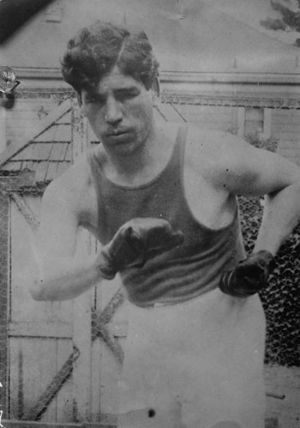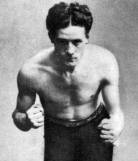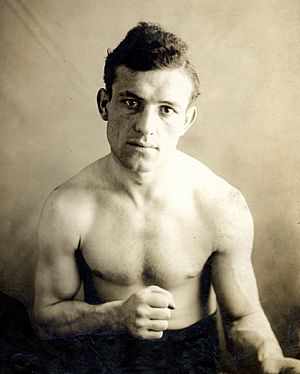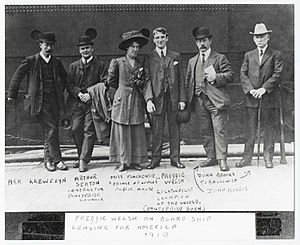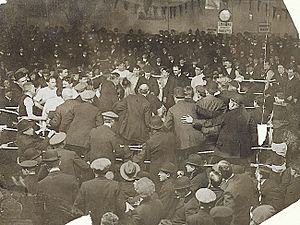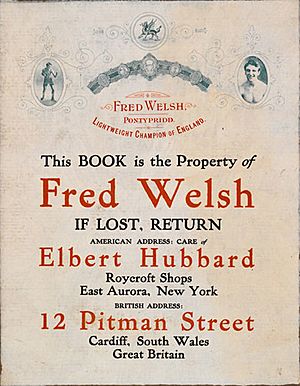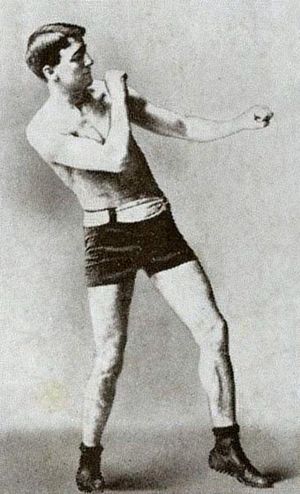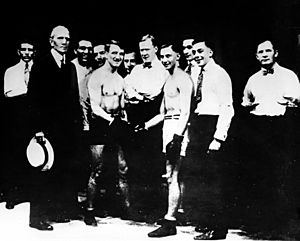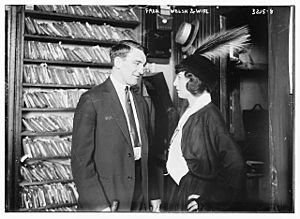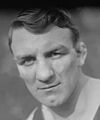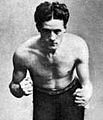Freddie Welsh facts for kids
Quick facts for kids Freddie Welsh |
|
|---|---|
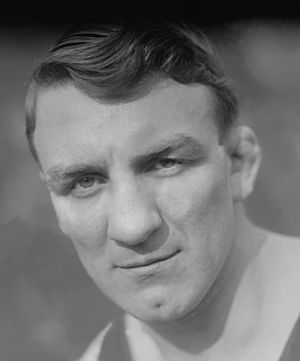 |
|
| Statistics | |
| Real name | Frederick Hall Thomas |
| Nickname(s) | The Welsh Wizard |
| Rated at | Lightweight |
| Reach | 69 in (175.3 cm) |
| Born | 5 March 1886 Pontypridd, Wales |
| Died | 29 July 1927 (aged 41) New York City, United States |
| Boxing record | |
| Total fights | 168; with the inclusion of newspaper decisions |
| Wins | 121 |
| Wins by KO | 34 |
| Losses | 29 |
| Draws | 17 |
| No contests | 1 |
Freddie Welsh (born Frederick Hall Thomas; 5 March 1886 – 29 July 1927) was a famous Welsh World boxing champion. He was a lightweight boxer, which means he fought in a specific weight class. Born in Pontypridd, Wales, he was known as the "Welsh Wizard." Freddie grew up in a mining town but moved to America to become a professional boxer in Philadelphia in 1905. He spent most of his boxing career fighting in the United States.
Freddie Welsh always aimed for the world championship title. He finally won it in July 1914, becoming the world lightweight champion after beating Willie Ritchie. He held this important title until 1917, when he lost to Benny Leonard. Even after that, he continued to box sometimes until 1922. Throughout his career, Freddie fought in over 160 professional matches. He was only officially defeated a few times.
Freddie was very interested in healthy living and exercise. He followed a "physical culture" plan, which meant he believed in staying fit. He didn't smoke and was a vegetarian. After his boxing career, he made some bad business choices and lost his money. He also had many health problems and sadly died in 1927 without much money.
Contents
- Freddie Welsh's Boxing Journey
- Early Life and Amateur Boxing
- Starting Professional Boxing (1905–1906)
- First Fights in Britain (1907)
- Back to America and First International Title (1907–1909)
- Big Fights and Losing the Title (1910–1911)
- Winning Back the British Lightweight Title (1911–1913)
- Chasing the World Title (1913–1914)
- Champion Years and World War I
- Later Life and Challenges
- Freddie Welsh's Legacy
- Images for kids
Freddie Welsh's Boxing Journey
Early Life and Amateur Boxing
Freddie Welsh was born in Pontypridd, Wales, on March 5, 1886. His father was an auctioneer, which was a good job at the time. Unlike many boxers from his era, Freddie had a comfortable childhood. He went to a grammar school in Pontypridd and later to a private college. When he was ten, his father passed away. Freddie's mother, who ran a hotel, sent him to live with his grandfather for a year. He later returned home to Pontypridd.
When Freddie was 14, he started working as a boilerman. At 16, he decided to seek a new life in Canada with three friends. They sailed from Liverpool to Vancouver in 1903. In Canada, Freddie became very interested in bodybuilding and healthy living. He followed the ideas of Bernarr Macfadden, who promoted "physical culture." After a year, he missed home and returned to Britain. He even worked on a cattle-boat to pay for his trip.
With his new fitness, he started amateur boxing in Scotland. He kept it a secret from his mother. After a year, he saved enough money to go back to America. He traveled to New York in 1904.
Freddie struggled to find steady work in the United States. He took odd jobs like working on farms or washing dishes. He even slept in cheap hotels. One time, after being robbed, a kind hotel manager gave him a job as a porter. His first job in New York was teaching boxing at one of Bernarr Macfadden's gyms. This is where he met Fanny Weston, who would become his wife.
He continued to work as a boxing instructor and trainer. Sometimes, when money was tight, he even shoveled snow. He took a job at a famous New York gym for low pay. He wanted to learn everything about professional boxing. Even though he often went days without eating, he didn't want to become a professional boxer. He wanted to keep his amateur status. But when friends saw him struggling, they suggested he take part in "private" fights for money. Freddie finally agreed and won his first few matches. At 19, he decided to become a professional boxer.
Starting Professional Boxing (1905–1906)
Freddie moved to Philadelphia to become an instructor. Before his first professional fight, he changed his name to Freddie Welsh. He didn't want his mother to know he was boxing if he failed. His first professional match was on December 21, 1905, against Young Williams. Freddie won by knockout in the third round! This was a great start.
He continued to fight often, sometimes twice a week. This helped him gain experience and build his strength. In March 1906, he faced four opponents. He won against Tommy Love and Kid Stinger. He also won on points against Eddie Lenny and had a draw with Johnny Dohan. Some of his early fights were "no-decision" bouts. This meant the winner wasn't officially declared, but newspapers often reported who they thought won.
On May 12, he won against Jack Reardon. Then he beat Kid Gleason and stopped Mike Loughlin in the second round. On June 15, he had a rematch with Frank Carsey, which was a "no-decision" fight. The newspapers thought Carsey won this time. Carsey later became a close friend and sparring partner for Freddie.
Freddie then had a tough win over Billy Glover. After that, he faced Young Erne, a smart boxer from Philadelphia. Their fight turned into an exciting slugging match, with both boxers attacking fiercely. The crowd loved it, and the newspapers said Freddie won. His next fight was his first 20-round match and his first outside Philadelphia. He fought Australian champion Hock Keys in Dayton, Ohio. Freddie hurt his right hand in the sixth round but kept fighting with his left hand. He won by technical knockout in the seventeenth round.
After beating Hock Keys, Freddie took a break. He fought Jimmy Dunn on August 31, a six-round fight that Dunn won according to the press. They had a rematch in Dayton, a 20-round fight that ended in a draw, which made the crowd angry. He fought two more times in America, winning both. Then, he received sad news that his mother was very ill. He quickly returned to Britain.
First Fights in Britain (1907)
When Freddie returned to Britain, he wasn't well-known yet. Even with his mother sick, he arranged fights. His first British fight was in London against Seaman Arthur Hayes, which Freddie won on points. He then won another points victory against Young Joseph. To introduce himself to Welsh fans, he put on a show in his hometown of Pontypridd. He fought three local boxers, stopping all of them in three rounds or less.
On May 21, Freddie fought Johnny Owens for the Welsh lightweight title. Freddie easily won the match. After a break, he beat Sid Russell on July 18. The next day, he had an exhibition match in Pontypridd, where he sparred with Jim Driscoll. Driscoll would become a very important rival in Freddie's career. Freddie then beat Young Lilly and Dick Lee. A few days later, Freddie and Driscoll had their first official match. Driscoll was working at a boxing booth, and Freddie accepted a challenge to last six rounds with him for £1. Driscoll was surprised when Freddie attacked him fiercely with illegal punches. Driscoll never forgot this.
After winning a rematch against Seaman Hayes, Freddie was invited to a special private fight. Some people thought Freddie had become too "American" and wanted to test him. They chose Joe White, a Swiss-Canadian boxer who had also learned to box in the U.S. The fight took place in a secret location in front of a small crowd. Freddie won in the sixteenth round when White gave up.
Freddie's last fight in Britain until 1910 was in Pontypridd on October 3. He fought two opponents on the same night, stopping both in five rounds. He beat Gunnar Hart, a welterweight champion, and then Arthur Ellis. Freddie never fought competitively in Pontypridd again. The next day, he left for America on the Lusitania.
Back to America and First International Title (1907–1909)
In America, Freddie met Fanny in New York, and they traveled to Philadelphia. On November 2, 1907, Freddie fought Cyclone Johnny Thompson. The fight was a "no-decision," but the newspapers said Freddie won. He had similar results against Boxer Kelly and Willie Fitzgerald. Then, he won a points decision against Dave Deshler in Chelsea, Massachusetts. Even Theodore Roosevelt, Jr. congratulated him!
Freddie continued to win, beating Eddie Carter, Kid Locke, and Maurice Sayers. He then had a draw with Charley Neary. Next, he faced Packey McFarland, considered one of the best lightweight boxers ever. McFarland won on points, but the fight was controversial. Freddie was knocked down by what looked like an illegal low punch, but the referee didn't see it. Fans were angry, saying the referee was unfair.
Because of the controversy, a rematch with McFarland was set for July 4. This fight got a lot of attention. The famous promoter Jim Jeffries offered the world champion, Joe Gans, $20,000 to fight the winner. Betting was heavy, and Jeffries himself was the referee. Freddie was winning for the first 19 rounds. But when news came that Battling Nelson had won the world title in California, Freddie's focus slipped. McFarland took control, and Freddie was knocked down in the last round. The fight ended in a draw. McFarland was furious, but Freddie also felt he should have won.
After the draw with McFarland, American newspapers started to doubt Freddie's power. They called him a "snowflake puncher" because he struggled to knock out opponents. Freddie was hurt by this and used his next three fights to prove them wrong. He gave Johnny Murphy a terrible beating, knocked out Frank Carsey, and put Harry Trendall on the canvas.
Freddie wanted to fight Nelson for the world title, but Nelson took a break. Around this time, Freddie was promised a fight for the European title against fellow Brit Johnny Summers. But the main challenger in California was Abe Attell, the world featherweight champion. After much excitement, they met on November 25, 1908. Freddie won on points, and one newspaper said Attell lost his title as "cleverest man in the game."
Freddie then had a close win over George Memsic. He traveled to New Orleans, where he beat Young Erne and knocked out Ray Bronson. Soon after, Freddie learned that Nelson would not fight him. Freddie continued to fight, with one more match in New Orleans against Young Donahue. This fight was difficult from the start. Freddie didn't like the referee, and when a new one was found, he was told to call a draw if there was no clear winner. The fight ended in a draw, which annoyed Freddie.
Freddie and Fanny moved to New York. On May 7, he made his New York debut against Johnny Frayne. Freddie won, but the reviews were not great. He was compared unfavorably to Jim Driscoll. Freddie finished his American tour with strong wins over Jack Goodman and Phil Brock. With his sights now on the Lonsdale Belt (a British boxing prize), Freddie returned to Britain.
When he arrived in Cardiff on June 19, many fans greeted him. Jim Driscoll was one of the first to welcome him. Cars were arranged to take Freddie through Pontypridd. Even though Pontypridd had 32,000 people, reports said 80,000 lined the streets to see their hero.
Freddie's return to Britain started with a fight against Young Joseph in Mountain Ash. The 20-round match ended in the eleventh round when Young Joseph was disqualified for illegal low punches. A month later, Freddie fought French lightweight Henri Piet. The newspapers weren't impressed with the choice of opponent, but Piet fought well before giving up in the twelfth round. After Piet, Freddie fought Joe Fletcher, an easy win that led to more negative press. There weren't many strong opponents for Freddie in Britain. But on November 8, Freddie got his chance to fight Johnny Summers for the British and European lightweight championship.
The Summers fight took place in London. Freddie took control from the first round. One reporter counted 200 successful punches to Summers' head. Summers was bleeding early in the fight. Some in the crowd booed Freddie for using kidney punches, which were allowed but seen as unfair. He was also warned for using his head. Freddie won on points, taking the Lonsdale Belt. He was a hero in Wales and America, but some in England saw him as a cold and unfair fighter.
Big Fights and Losing the Title (1910–1911)
After winning the Lonsdale Belt, Freddie took a break from boxing. He earned good money performing in London music halls. A chance meeting with Packy McFarland led to a third fight between them. Freddie won a warm-up fight against Jack Daniels. Then he faced McFarland in London. The fight was called the "Light-weight Championship of the World," but Ad Wolgast actually held that title. McFarland started strong, winning the first nine rounds. Freddie fought back, but the British newspapers felt McFarland should have won. The 20-round fight was declared a draw.
In the summer of 1910, Freddie found it hard to find fights. Wolgast was too expensive, and McFarland couldn't make the weight. The National Sporting Centre couldn't find a good challenger for Freddie's Lonsdale Belt. Jim Driscoll was in a similar situation, so a highly anticipated match was arranged between them. Freddie had two easy wins before the Driscoll fight in December. The long build-up made their friendship sour. When they met to sign contracts, they argued about the referee. Driscoll got angry and left the meeting.
The fight took place on December 20, 1910, in Cardiff, in front of 10,000 people. Freddie started well, surprising the crowd. But in the fifth round, he began using kidney punches, and the crowd yelled "foul!" He also tried to hold Driscoll and hit him. By the eighth round, Driscoll was fighting back. In the tenth round, Driscoll, annoyed by Freddie's tactics, head-butted him. The referee immediately disqualified Driscoll. After the fight, people from both boxers' teams started arguing and fighting, and the police had to step in.
In early 1911, Freddie was about to go to the United States. But Matt Wells, a lesser-known British boxer, challenged him. Freddie accepted, but he wasn't ready for Wells. Wells had been studying Freddie for 18 months. On February 27, 1911, Freddie entered the ring to little applause. The crowd supported Wells, the underdog. Wells fought perfectly, building a big lead by attacking Freddie early. He then defended his lead for the rest of the match. After 20 rounds, Wells won the decision and the championship title. Freddie left for America on March 11, 1911, no longer a champion.
Winning Back the British Lightweight Title (1911–1913)
Losing in Britain hurt Freddie's reputation in America. He wanted to fix that. He had an easy win over Pal Moore. Then he went to California and beat Matty Baldwin in a great boxing display. On August 4, 1911, it was announced that Wolgast would fight Freddie for the world title on November 30. This was Freddie's first chance at the world title. The excitement was huge. Just days before the fight, the referee died. This led to arguments between Freddie and Wolgast's manager about who the new referee should be. Freddie eventually accepted the manager's choice. But on the night before the fight, Wolgast was rushed to the hospital with appendicitis. He couldn't fight for three months. Wolgast's replacement, Willie Ritchie, fought Freddie for 20 rounds. Even though Freddie won, fans wondered how he would have done against the champion.
In January 1912, Freddie dislocated his neck while wrestling. He couldn't box and was running out of money. He left San Francisco in March and traveled to Canada for an exhibition match. Then he went to Chicago for two months. Freddie decided to go to New York to earn money from shorter fights. He fought Jimmy Duffy in Buffalo and won, even though he was overweight. In Buffalo, Freddie visited his friend Elbert Hubbard. After talking about life, Freddie returned to boxing with a new goal: to win back his British title. He fought three more times in America before returning to Britain.
In September 1912, Freddie sailed back to Britain. A rematch with Matt Wells was planned for November 11. Freddie warmed up with a points win over Jack Langdon in Liverpool. Three weeks later, he faced Wells again in London, this time as the challenger. Wells won the first four rounds. But in the sixth, Freddie landed strong punches that slowed Wells down. By the tenth round, the fight was even, and Freddie took control. After 20 rounds, Freddie was declared the European and British champion again!
Just before his next fight, news came that Willie Ritchie had taken the world title from Wolgast. This made Freddie's claim for a world title shot even stronger. Before he could go back to America, a British Empire title fight was arranged against Australian Hughie Mehegan. The fight went 20 rounds. Freddie won on points but took a severe beating. He said he couldn't sleep for days from the pain.
In early January 1913, Freddie's mother, who had been ill, passed away. He put his plans to chase Willie Ritchie on hold and stayed in Wales with his family. He fought four more times in Britain. He stopped Frenchman Paul Brevieres in Aberdare. Then he won on points against Young Nipper and successfully defended his European title against Raymond Vittet. He finished with a points win over Eddie Beattie. The last three fights were within seven days. Freddie almost paid the price for this busy schedule when Beattie knocked him down for nine seconds in the ninth round.
Chasing the World Title (1913–1914)
When Freddie returned to America, he was determined to fight Ritchie. He had missed his chance with Nelson and Wolgast. He hired Harry Pollok, a famous sports promoter in New York. When Freddie and Fanny arrived in New York on March 29, 1913, Pollok made sure reporters and photographers were there. Even with Pollok's help, Ritchie was hard to pin down. Champions often stayed on the East Coast, fighting in six-round matches where they couldn't lose their title unless they were knocked out. When Freddie arrived, Ritchie's manager announced that Ritchie wouldn't fight for four months because he was touring Europe.
To prepare for a possible title fight, Freddie started training. He fought Al Ketchell in April. Then he went to Canada and won against Jack Redmond and Kid Scaler. These fights were followed by matches against Billy Farrell, Ray Campbell, Young Jack O'Brien, and Martin Murphy. In early July, Freddie stopped his Canadian tour to watch Ritchie's return fight. It was not impressive, but Ritchie won by knockout. During this time, to stay in the news, Freddie revealed that he and Fanny Weston had been secretly married since 1905. He also did a stunt to break the Canadian land speed record, riding with "Speed King" Bob Burman in his fast car.
Eventually, a fight between Freddie and Ritchie was set for September 4, 1913, in Vancouver. But Freddie twisted his ankle in training, so the date was moved to the 20th. Worse, the night before the fight, Ritchie left Vancouver, saying he was unhappy about the filming rights. Around the same time, a gold belt Freddie had won was stolen from a tea room. It was later found when a man tried to smuggle it out of the country.
Freddie responded to his bad luck by fighting even more. With three months left in the year, he arranged five fights. He won two points decisions against Fighting Dick Hyland and Leo Kossick. Then Milburn Saylor was disqualified for an illegal low blow. Freddie beat Phil Bloom in New York and knocked out Canadian Champion Arthur Ellis in Canada. Back in the U.S., Freddie, despite struggling with his weight, beat Johnny Dundee and Frank Whitney. He won three fights in three different cities in just ten days! On January 15, 1914, he easily beat Mickey Sheridan. He won two more fights in January against Earl Fisher and Leo Kelly. With his weight under control and more money, Freddie and Pollok focused on Ritchie again. American sportswriters were calling Freddie a "has-been." So, they decided that if Ritchie wouldn't agree to a fight, they would beat all of Ritchie's top challengers until he had no choice but to face Freddie.
Their first target was Mexican Joe Rivers, who had already tried twice for the lightweight title. Before this fight, Freddie suffered his first loss since 1911, a "no-decision" to Jimmy Duffy. But he continued to prepare for Rivers on March 17. Rivers was the favorite, but Freddie dominated the fight, winning on points. After the fight, at a celebration, Freddie saw a newspaper reporting that King George V was interested in boxing. Freddie wrote to the King, and the next day, he received a royal telegram! Almost every major newspaper printed the letters, giving Freddie a lot of publicity.
In spring 1914, Freddie asked Ritchie if he would fight in England if he got enough money. Ritchie agreed. Freddie started booking advertising space in London. But Ritchie then demanded $50,000, win or lose, which Freddie called "ridiculous." Even so, England desperately wanted a world champion, and $40,000 was raised. Ritchie accepted but said he already had a fight planned. The London group gave in to his demands. Before Ritchie's fight with Charley White, Freddie won two more fights. Then, everyone focused on the White-Ritchie fight. White almost knocked Ritchie out early but couldn't finish him. White won, but Ritchie kept his world title because he wasn't knocked out. Pollok and Freddie took a big risk. They sent Ritchie a fake telegram saying promoters wanted them to fight White instead. The next day, Ritchie accepted $25,000 and expenses to fight Freddie in London.
Freddie and Pollok sailed to Britain. When he arrived on June 12, Freddie told reporters that Fanny had given birth to their first child, Elizabeth. The big fight took place on July 7. Freddie took control from the first round. Ritchie only won one round, the sixth, when he hit Freddie on the jaw. Freddie played defense but landed many jabs to Ritchie's head. Ritchie kept trying for a knockout punch but couldn't land a big one. In the seventeenth round, Ritchie tried harder, but it wasn't enough. Freddie was declared the winner and the lightweight boxing champion of the world! Most people agreed Freddie won ten rounds, Ritchie won five, and five were even. After the fight, the new champion went to his hotel to see his daughter for the first time.
Champion Years and World War I
Just 25 days after Freddie became champion, World War I began. His plans to earn money by touring theaters were canceled, and he lost over $50,000. Thanks to a manager from the White Star Line, he, Fanny, and Elizabeth got first-class tickets to America. Some newspapers accused him of being a coward for not joining the British Army. Freddie replied that he did many events to support the troops. He said, "I can do far more for my country out of the trenches than in them."
In 1914, only two U.S. states allowed 20-round championship fights to have an official winner. No promoters in those states offered enough money for Freddie to risk losing his title. To earn money as champion, Freddie fought many 10-round "no verdict" matches. As long as he was still standing at the end of 10 rounds, he couldn't lose his title. Still, Freddie wanted to show he wasn't afraid of tough opponents. His first defense was against Matty Baldwin on October 27, which he won on points. Six days later, he fought Al Wolgast, the former champion who had avoided Freddie before. The fight was almost sold out in New York. Wolgast was a crowd favorite. The first few rounds were even. But at the end of the fifth round, Wolgast broke his arm blocking a punch. He kept fighting with only his left hand but couldn't continue after the eighth.
A week later, Freddie faced Charley White, who many thought was the best challenger for the lightweight title. The 10-round fight was very one-sided, with Freddie landing four times as many punches as White. White had a stronger punch, but he only managed to draw blood in the tenth round. Many writers didn't even give White one round.
Freddie was expected to retire in 1915, but he kept fighting. He held the title until May 1917, when he was knocked out by Benny Leonard in New York. This was the first time in his career he had been stopped. Leonard controlled the fight. After being knocked down in the ninth round, Freddie got back up and took more punches before the referee stopped the match.
Later Life and Challenges
Freddie Welsh retired from boxing after a defeat by Archie Walker in 1922. He had been a wealthy man. Before losing to Leonard in 1917, Freddie bought a large farm in Chatham Township, New Jersey. He spent a lot of money improving it, adding a gym, a modern kitchen, a golf course, tennis courts, and a swimming pool. He wanted to turn it into a health spa. On August 11, 1917, many famous people and important guests came to its opening. One guest described it as a "palatial home sitting high upon a hill."
Freddie found the farm distracting and thought about joining the British forces. But Fanny convinced him not to. Instead, he joined the United States Army as a lieutenant. He worked at the Walter Reed Hospital, helping injured veterans recover.
By 1918, Freddie was struggling with the farm and wanted to sell it. He had spent all his life's earnings, $150,000, on it. But he couldn't find a buyer. His dream of running a health farm was falling apart, and his life began to unravel. On October 11, 1919, Freddie had a violent argument with his former manager, Harry Pollok, in a restaurant. Pollok ended up in the hospital with a serious ear injury. Pollok accused Freddie of biting his ear. Freddie denied it, and the case was dismissed when Pollok didn't show up in court.
In 1920, Freddie was discharged from the Army as a captain. He returned to his farm. With his money running low, he decided to return to boxing. After six months of training, he fought "Kid" Green on December 28, 1920. Despite being away from the ring for three and a half years, Freddie was in good shape and beat Green in four rounds. He had changed his style from defensive boxing to a more aggressive brawling style. Freddie fought twice more in May 1921, winning both. The famous heavyweight champion Jack Dempsey even spent time relaxing at Freddie's health farm. After two more fights in Canada in 1921, Freddie returned to New York to face Archie Walker in April 1922. This fight was a disaster for Freddie. He lost seven of the ten rounds and was chased around the ring in the tenth. It was a sad performance, and Freddie never boxed professionally again.
By 1923, during Prohibition (when alcohol was illegal), Freddie's farm attracted more guests for its homemade ciders and beers than its sports facilities. In 1924, the famous writer F. Scott Fitzgerald visited the farm and sparred with Freddie. In 1924, Freddie was in court again after a car accident he caused by driving on the wrong side of the road. Freddie started looking for other ways to make money. In 1925, he rejoined the U.S. Army as a boxing instructor at the Plattsburg Barracks in New York. While in the Army, he advertised for a manager to run his farm. His neighbor and friend, Sidky Bey, and his wife Hranoush, known as Madame Bey, took the job. Madame Bey made the farm successful by having strict rules and no alcohol. It became an important training place for New York boxers. But her time at the farm ended badly after an argument with a boxer named Battling Siki, whom Freddie thought was a bad influence. After Madame Bey left, the farm fell apart. Bey later said Freddie was a fun person but a terrible businessman.
In 1927, Freddie couldn't pay the mortgage on his farm. It was sold for much less than it was worth. After losing the farm, Fanny and Freddie separated. Fanny became a housekeeper. Soon after, Freddie's health got worse, and he complained of severe chest pains. His doctor said he was depressed and drinking too much. On July 17, 1927, Freddie appeared in court with a black eye from a street fight. He was charged with disorderly conduct after a drunken fight. The police officer who saved Freddie from a serious beating told the judge it was a friendly fight, and the charges were dropped.
On July 28, 1927, a maid found Freddie dead in his hotel room. A doctor said he died of a heart attack. On October 13, 1927, Freddie's old health farm was destroyed in a fire.
Freddie Welsh's Legacy
Freddie Welsh was honored for his boxing career. He was inducted into the 'Ring Boxing Hall of Fame' in 1960. He also joined the Welsh Sports Hall of Fame in 1994 and the 'International Boxing Hall of Fame' in 1997.
In 2008, the local council in Rhondda Cynon Taf decided to put up a blue plaque at his old boxing club. This plaque remembers his life and achievements. Welsh boxer Dai Dower unveiled the plaque the next year.
Boxing Style
Freddie Welsh was often described in the British press as having an "ungentlemanly" boxing style because he learned to box in America. His family had a history of boxing, with his grandfather being a "mountain fighter."
Even though people often said Freddie couldn't knock out his opponents, his style was about his quick footwork and avoiding punches. He was calm and hard to hit, which frustrated strong punchers. Freddie often finished long fights without injuries, while his opponents were badly hurt. He was known as a "long-distance fighter," meaning he was good at fighting for many rounds.
Vegetarianism
Freddie Welsh often told reporters he was a vegetarian. This was unusual at the time and often met with jokes. Freddie was a vegetarian for health reasons, inspired by Bernarr Macfadden's writings. He wasn't interested in animal welfare. After Freddie beat Phil Brock, Macfadden sent him a telegram saying, "Hope you will go through the whole bunch of meat eaters."
Even though he promoted vegetarianism, he would eat meat if he had to. He once said, "I eat as much raw food as possible... I find plenty of vegetable and fruits to choose from without touching meat at all. I am not a faddist, and, I eat meat when I cannot get anything else."
Later in his life, he didn't stick to vegetarianism as strictly. His difficulty in keeping his weight down after 1913 was blamed on him changing his diet. Freddie was known to sneak away after training to eat his favorite meal, Chicken Maryland.
Images for kids
 | Tommie Smith |
 | Simone Manuel |
 | Shani Davis |
 | Simone Biles |
 | Alice Coachman |


